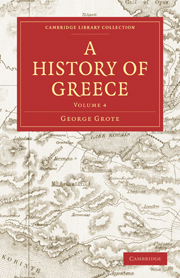Book contents
- Frontmatter
- Contents
- PART II CONTINUATION OF HISTORICAL GREECE
- CHAPTER XXV Illyrians, Macedonians, Pæonians
- CHAPTER XXVI Thracians and Greek Colonies in Thrace
- CHAPTER XXVII Kyrênê.—Barka.—Hesperides
- CHAPTER XXVIII Pan-Hellenic Festivals—Olympic, Pythian, Nemean and Isthmian
- CHAPTER XXIX Lyric Poetry.—The Seven Wise Men
- CHAPTER XXX Grecian Affairs during the Government of Peisistratus and his Sons at Athens
- CHAPTER XXXI Grecian Affairs after the Expulsion of the Peisistratids.—Revolution of Kleisthenês and Establishment of Democracy at Athens
- CHAPTER XXXII Rise of the Persian empire.—Cyrus
- CHAPTER XXXIII Growth of the Persian Empire
- CHAPTER XXXIV Dêmokêdês.—Darius invades Scythia
- CHAPTER XXXV Ionic Revolt
- CHAPTER XXXVI From Ionic Revolt to Battle of Marathon
- CHAPTER XXXVII Ionic Philosophers.—Pythagoras.—Kroton and Sybaris
- Titles in the Series
CHAPTER XXXII - Rise of the Persian empire.—Cyrus
Published online by Cambridge University Press: 29 August 2010
- Frontmatter
- Contents
- PART II CONTINUATION OF HISTORICAL GREECE
- CHAPTER XXV Illyrians, Macedonians, Pæonians
- CHAPTER XXVI Thracians and Greek Colonies in Thrace
- CHAPTER XXVII Kyrênê.—Barka.—Hesperides
- CHAPTER XXVIII Pan-Hellenic Festivals—Olympic, Pythian, Nemean and Isthmian
- CHAPTER XXIX Lyric Poetry.—The Seven Wise Men
- CHAPTER XXX Grecian Affairs during the Government of Peisistratus and his Sons at Athens
- CHAPTER XXXI Grecian Affairs after the Expulsion of the Peisistratids.—Revolution of Kleisthenês and Establishment of Democracy at Athens
- CHAPTER XXXII Rise of the Persian empire.—Cyrus
- CHAPTER XXXIII Growth of the Persian Empire
- CHAPTER XXXIV Dêmokêdês.—Darius invades Scythia
- CHAPTER XXXV Ionic Revolt
- CHAPTER XXXVI From Ionic Revolt to Battle of Marathon
- CHAPTER XXXVII Ionic Philosophers.—Pythagoras.—Kroton and Sybaris
- Titles in the Series
Summary
In the preceding chapter I have followed the history of Central Greece very nearly down to the point at which the history of the Asiatic Greeks becomes blended with it, and after which the two streams begin to flow to a great degree in the same channel. I now revert to the affairs of the Asiatic Greeks, and of the Asiatic kings as connected with them, at the point in which they were left in my seventeenth chapter.
The concluding facts recounted in that chapter were of sad and serious moment to the Hellenic world. The Ionic and Æolic Greeks on the Asiatic coast had been conquered and made tributary by the Lydian king Crœsus: “down to that time (says Herodotus) all Greeks had been free.” Their conqueror Crœsus, who ascended the throne in 560 b.c., appeared to be at the summit of human prosperity and power in his unassailable capital, and with his countless treasures at Sardis. His dominions comprised nearly the whole of Asia Minor, as far as the river Halys to the east: on the other side of that river began the Median monarchy under his brother-in-law Astyagês, extending eastward to some boundary which we cannot define, but comprising in a south-eastern direction Persis proper or Farsistan, and separated from the Kissians and Assyrians on the west by the line of Mount Zagros (the present boundary-line between Persia and Turkey).
- Type
- Chapter
- Information
- A History of Greece , pp. 243 - 279Publisher: Cambridge University PressPrint publication year: 2010First published in: 1847

